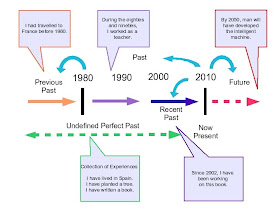How to use the words “say, tell, speak and talk”.
Say – Examples: [1] “He said that he was hungry.” [2]“What did he say about the exam?” [3]“What did she say to you?”
Tell – Examples: [1]“He told me that he was hungry” – not “He told to me….” (“Tell” means “say to, so “tell to” would mean “say to to”) [2]“He told me to close the window.” (Here “to” is part of an infinitive and expresses a command.) [3]“She told me about her dog.”
Speak – Examples: [1] “Do you speak English?” (Meaning: “Are you able to speak English?”) [2] “She spoke about her trip.” (Correct, but “talked” is more common) [3] “They spoke in Korean.” (Meaning: “They used Korean to communicate”) [4] “He spoke to me.”
They used Korean to communicate.”) Don’t say “They talked Korean.”
 David is speaking about stock market and everyone else is listening.
David is speaking about stock market and everyone else is listening. O aprendizado de uma língua estrangeira consiste não apenas na assimilação de seus elementos gramaticais e lexicais, mas também em saber empregar o conhecimento adquirido sem a interferência negativa da língua mãe. Sendo esta interferência mais alarmante no oral, podemos também incluir a ocorrência no plano gramatical, levando os aprendizes de um idioma a produzirem frases desestruturadas e incompreensíveis. Na ânsia de se comunicarem e expressarem suas idéias, os alunos muitas vezes associam a estrutura usada no português à língua inglesa, criando assim uma grande confusão e uso inadequado de algumas palavras e expressões.
Assim, se faz necessário identificar e conhecer as diferenças entre a língua portuguesa e inglesa para que possamos prever os erros bem como evitá-los antes de se tornarem hábitos. Vale ressaltar, que muitos destes erros podem ser observados mesmo em alunos que já possuem um nível elevado de fluência, e resultam da falta de contato com a língua ou de um aprendizado defasado.
Os verbos Speak, Talk, Say e Tell, embora praticamente sinônimos no significado e gramaticalmente diferentes, geram inúmeras dúvidas para os alunos, e é preciso se atentar a algumas regras para evitar alguns deslizes na comunicação. Para entender melhor as diferenças, segue abaixo uma classificação por área de significado e alguns exemplos para reforçar a explicação:
SIGNIFICADO | PORTUGUÊS | INGLÊS | EXEMPLOS |
| ter habilidade lingüística | falar | speak | He speaks English and French. |
| transmitir informação | dizer, falar, contar, afirmar, relatar, avisar | say, tell, state, report | He said that he`s not going to run for president.
He told the reporters he`s not going to run for president.
He stated clearly that he`s not going to run for president.
The government has reported a decline in the foreign debt. |
| conversar, bater papo | falar, conversar, dialogar | speak, talk, chat | I spoke with my friends yesterday about the old times.
We talked all night about the old times.
He likes to chat with his old friends. |
 Aaron, Michael and Jessica are talking about today’s lessons.
Aaron, Michael and Jessica are talking about today’s lessons.
| Uses | Examples |
| Say | used with direct and indirect speech
Say is most often used without a personal object.
If we want to put a personal object after say, we use to.
| She said that it was my last chance.
He said, ‘Good morning.’
She said that she would be late. (not She said me...)
And I say to all the people of this great country... |
| Tell | used with direct and indirect speech
after tell, we usually say who is told, i.e., tell someone something
only used to mean ‘instruct’ or ‘inform’
Tell is used to tell someone to do something
Tell is not used before objects like a word, a name, a sentence, a phrase.
We do not usually use it after tell to refer to a fact.
tell someone again (repeat)
|
She told me that she would be late.
She told me that it was my last chance.
(not He told them, ‘Good morning.’)
Tom’s mother told him to clean his room.
Alice said a naughty word...
(not Alice told a naughty word...)
‘I’ll tell you tomorrow.’ (not I’ll tell you it tomorrow.)
‘I don’t want to tell you again to get your homework done.’ |
| Talk | There is not very much difference between speak and talk.
Talk is the more usual word to refer to conversational exchanges and informal communication.
| When she walked into the room everybody stopped talking. |
| Speak | Is often used for one-way communication and for exchanges in more serious or formal situations.
Speak is the usual word to refer to knowledge and use of languages.
| I’ll have to speak to that boy -- he’s getting very lazy.
After she had finished reading the letter, nobody spoke.
She speaks three languages fluently. |
 Teacher Marion was telling the kids the story of Jesus.
Teacher Marion was telling the kids the story of Jesus. Referências:
Say/Tell/Speak/Talk
| Uses | Examples |
| Say | used with direct and indirect speech
Say is most often used without a personal object.
If we want to put a personal object after say, we use to.
| She said that it was my last chance.
He said, ‘Good morning.’
She said that she would be late. (not She said me...)
And I say to all the people of this great country... |
| Tell | used with direct and indirect speech
after tell, we usually say who is told, i.e., tell someone something
only used to mean ‘instruct’ or ‘inform’
Tell is used to tell someone to do something
Tell is not used before objects like a word, a name, a sentence, a phrase.
We do not usually use it after tell to refer to a fact.
tell someone again (repeat)
|
She told me that she would be late.
She told me that it was my last chance.
(not He told them, ‘Good morning.’)
Tom’s mother told him to clean his room.
Alice said a naughty word...
(not Alice told a naughty word...)
‘I’ll tell you tomorrow.’ (not I’ll tell you it tomorrow.)
‘I don’t want to tell you again to get your homework done.’ |
| Talk | There is not very much difference between speak and talk.
Talk is the more usual word to refer to conversational exchanges and informal communication.
| When she walked into the room everybody stopped talking.
|
| Speak | is often used for one-way communication and for exchanges in more serious or formal situations.
Speak is the usual word to refer to knowledge and use of languages.
| I’ll have to speak to that boy -- he’s getting very lazy.
After she had finished reading the letter, nobody spoke.
She speaks three languages fluently. |
Muito provavelmente você já teve essa dúvida: devo usar speak ou talk? Say ou tell? Essas palavras realmente nos confundem… Pois seus significados são muito semelhantes (e por vezes intercambiáveis).
Exemplos:
1. The pupils said “thank you” to the teacher. Os alunos disseram “obrigado” à professora.
2. Peter said that he is leaving at eleven. O Peter disse que sairá às 11.
3. Do you speak Japanese? Você fala japonês?
4. Can I speak to Mr. Green? Posso falar com o sr. Green?
5. Amanda talked to her boss about the assistant. A Amanda conversou/falou com seu chefe sobre o assistente.
6. Jack told Ann about the new plan for the company. O Jack contou/disse à Ana sobre o novo plano para a empresa.
7. You told a story to your child after lunch. Você contou uma estória para o seu filho após o almoço.
Cada um desses verbos tem regras de uso que nos ajudam a utilizá-los de forma adequada. Você consegue identificá-las nas frases acima? Por exemplo: quais verbos requerem o uso de preposição?
Podemos esquematizar o seguinte quadro:
SAY
1
something
to somebody
2
that…
SPEAK
3
a language
4
to somebody
about something/somebody
TALK
5
to/with somebody
about something/somebody
TELL
6
somebody
(about) something
7
something
to somebody
Essas diferenças de uso são importantes e não se pode, pura e simplesmente, traduzir esses termos respectivamente por falar, conversar, dizer e contar. Essa tradução “literal” não funcionará em muitas expressões – às vezes elas são construídas sem quaisquer dos verbos:
falar sério: to be serious
por falar nisso: by the way
quem fala? (ao telefone): who’s calling?
O quadro acima é apenas uma estruturação básica desses verbos. Mas como você já percebeu, a língua é um fenômeno dinâmico e flexível. Por isso você precisa conhecer os outros usos dessas palavras, as suas combinações mais comuns (collocations) e expressões mais conhecidas da língua inglesa:
SAY
- Para reportar falas e indicar frases textuais: “I’ll always love you,” he said.
- Para questionar sobre palavras em outra língua: How do you say ‘lawyer’ in Portuguese?
- Para exemplificar algo: I’d like to have, (let‘s) say, at least three million dollars.
- Para indicar a leitura de um texto, mapa, gráfico, relógio: The guidebook says that hotel is not very expensive.
It goes without saying that…: É óbvio que…
that is to say: ou seja
to say goodbye: dizer adeus
to say a prayer: orar, rezar
TELL
- Para indicar ordens ou conselhos: The police officer told me not to cross that bridge.
to tell A from B: distinguir entre A e B
to tell the truth: dizer/falar a verdade
to tell a story: contar uma estória
to tell the time: dizer as horas
to tell a secret: contar um segredo
to tell the future: prever o futuro
You can tell she’s American: Dá para notar que ela é americana.
you never can tell: nunca se sabe
I told you (so): eu lhe disse/avisei
you’re telling me! : isso não é novidade para mim!
TALK
- Para indicar planos e intenções: They’re talking about moving to the countryside.
- Para se referir ao ato da fala em geral: Joey started to talk when he was 2 years old.
to talk business: falar de negócios
to talk sense: falar algo sensato
to talk about (sports, politics…) : falar de (esportes, política…)
to talk behind somebody’s back: falar pelas costas de alguém
SPEAK
- Para orientar nosso interlocutor: Could you speak more slowly please?
- Quando se expressa idéias ou opiniões: Matthew spoke as a citizen, not as the governor.
to speak the truth: dizer a verdade
to speak for itself: falar por si mesmo
to speak your mind: falar sem rodeios
to speak in public: falar em público
generally speaking: falando em termos gerais
so to speak: por assim dizer
Lembre-se não se trata de decorar essas regras ou as listas de expressões. Mas sim usá-las o quanto mais for possível. Escolha, por exemplo, algumas delas – as que você acredita que serão mais úteis para você – e pratique: escreva textos para seus amigos, procure exemplos na internet, busque identificá-las em músicas e filmes. Assim, usando a língua inglesa “pra valer” é que você terá sucesso no aprendizado do idioma.
Good luck and keep practicing!
That’s all, folks! See ya next week!
Exercício 1
Como você completaria com say, tell, speak e talk? (as respostas podem estar no presente, passado ou futuro)
a. Mary ………. to me about the school party. She also ………. that she and her sister were coming.
b. Larry and Gina …………. many languages. Last week Larry ……….. to the students in my school about how to learn a language.
c. Daniel …………. at the conference next week.
d. Frank always ………….. funny stories when we are together.
e. Lara didn’t ………….. anything to me.
f. She didn’t …………. me anything.
Exercício 2
Como você diria isso em inglês?
a. O Paulo fala inglês.
b. Ontem ele nos contou uma piada em inglês.
c. Eu e a Marta sempre conversamos sobre o curso.
d. Ela disse que vai parar de estudar.
e. John sempre diz que ler é um bom hábito.
Exercício 3
Veja o quadro do artigo
Falar inglês: speak, talk, tell ou say?, em que o professor Rogerio esquematiza o uso de say, tell, talk e speak com as preposições mais comuns. O que você disse ou ouviu essa semana que poderia ser dito com estas expressões? Deixe suas respostas nos comentários.
Exercicio 4
Em que sentenças há erros? Qual a maneira correta de dizê-las?
a. Mike talks nonstop.
b. Daniel said me that this restaurant is good.
c. Janet spoke to us a lie.
d. Dina says (that) she will be here by 8 o’clock.
e. She talked Jenny about the secret.
f. He told that the food was good.
























